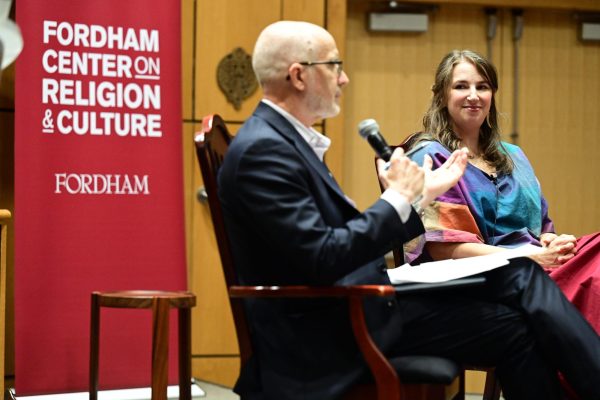Students Struggle to Receive Class Credit for Unpaid Internships
By Erica Scalise
With the spring semester coming to a close, landing an internship and spending the summer in the city continues to entice students. However, for some, the cost of interning during the school year or in the summer comes with a hefty price tag, especially when accepting an unpaid position.
The university offers three options during the summer to obtain credit for an unpaid internship. This includes the summer internship program, a four credit class in cooperation with Career Services for $3600 and a suggested grade point average of 3.0, a tutorial in which students can obtain one to four credits for $915 per credit or the 0.5 credit option in which students who do not require credits within a specific discipline pay $495.
According to Maura Mast, Ph.D., dean of Fordham College Rose Hill, the 0.5 credit option was created in the summer of 2018 in response to student and faculty concerns about students having to register and pay for a course in the summer in order to receive credit for an internship.
“This is a difficult situation,” said Mast. “Internships are incredibly popular, and data from Fordham’s Office of Institutional Research indicate that most Fordham undergraduate students participate in at least one internship during their undergraduate careers. Many of our students hold paid internships, but this is not always the case.”
After conducting research on how other schools approach the issue, Mast said FCRH piloted the 0.5 credit option in summer 2018 and will offer it again in summer 2019.
During the academic year at Fordham, students can enroll in an internship for credit and usually do not have to pay an additional cost unless they exceed their credit ceiling, according to Mast.
For Ashley DiMatteo, FCRH ‘21, taking an unpaid internship as a sophomore would exceed her credit ceiling. She referred to this process as “financially burdensome.”
“Traveling to the city is super expensive, and the Ram Van can be tricky because of traffic. This can financially discourage people to take an internship, especially if they aren’t getting credit for it,” said DiMatteo. “In my senior year, with my major, I have to take an internship class, so I will be getting credit eventually in some way, but by the time I’m a senior, I will most likely have gotten another internship, and so really I feel that I should be getting credit for my current internship now.”
When considering the cost, DiMatteo also pointed to the potentially taxing nature of unpaid internships.
“I think that having an unpaid internship is a great experience in the sense where you get to really learn a lot, and that is super valuable,” she said. “However it’s easy for some companies to take advantage of interns and in that case it’s unproductive.”
According to Maria Aponte, assistant director of Global Diversity & Inclusion Career Services, each of the options require students to meet with their class dean to receive permission to obtain credit. Career Services does not issue credit, though the internship tutorial has been part of Career Services for over 15 years.
“Once a student is approved to receive credit via the tutorial, they meet with an instructor to discuss the importance of the professional development they are learning in the internship and how it will reflect on their major and career building,” said Aponte.
Students meet with the instructor three times throughout the academic semester to cover academics, growth and assessment of the internship experience and are required to write a two to three page paper about the internship, according to Aponte.
Aponte also said students are required to read chapters from the assigned book on internships as part of their reflection on the importance of interning.
Sabrina Sahler, FCRH ’21 worked remotely as an editorial intern this past semester. She said any negatives were outweighed by being able to work with a patient and understanding staff.
“I think it’s easier in the case of my unpaid internship because I don’t have to commute to do my job, so I’m not spending money on transportation,” said Sahler. “I took my internship not with the intention to get credit, but just to get experience for the future and I wound up really liking it and liking who I work with.”
Sahler also said she felt favored in her internship because she came from Fordham.
“My boss says she prefers to hire Fordham students because we’ve been the hardest working interns she’s seen, so that was really nice to be able to have that positive connection off the bat.”
Though a compromise was set in the form of the 0.5 credit option, other students still find themselves displeased with the overall internship policy.
Andrew Millman, FCRH ‘21 has also enjoyed his unpaid internship, but was unable to obtain credit as a sophomore.
“I emailed Dean Mast, but she said it was Fordham policy that you could only get credit after sophomore year and I’m a second semester sophomore,” said Millman.
However, Fordham is not the only university with this policy. Though internship grants are available to a select number of students, the policies for unpaid internships at New York University (NYU) remain the same. According to NYU’s website, tuition and fees for internships are generated in the same way as are those for classroom courses.
Meanwhile at schools such as Columbia University, most schools and programs within the university do not offer academic credit for internships.
According to Columbia’s Center for Career Education, academic credit should not replace compensation for work performed during an internship
“The whole paying Fordham for credit on something that’s not through them is kinda ridiculous to be honest,” said Millman.










































































































































































































